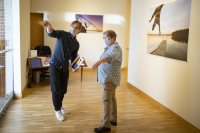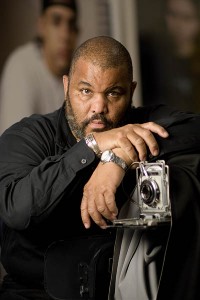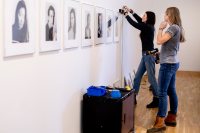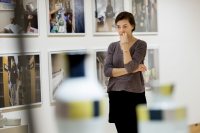
OIE to present Dawoud Bey, a photographer who looks beyond stereotypes
A photographer renowned for his ability to capture the individual reality overlooked in conventional portrayals of teenagers and other stereotyped groups, Dawoud Bey discusses his work at 5:30 p.m. Wednesday, Feb. 15, in the Benjamin Mays Center at Bates College, 95 Russell St.
Sponsored by the Office of Intercultural Education and the Bates College Museum of Art, this event is open to the public at no cost. For more information, please contact 207-786-8303 or eburke@bates.edu.
“Dawoud is a stunning artist whose photography seeks to challenge our assumptions and bridge our differences,” says Roland Davis, OIE director. “He’s a truth teller, but he also demands that we look closely at our preconceptions about people, because often there’s so much more than what we see.”
The OIE supports the advancement of diversity and inclusion at Bates, and Bey is the office’s inaugural Visiting Artist and Scholar. “The arts can be a really powerful voice in our discussions of difference,” says Davis. “My hope with the Visiting Artist and Scholar program is to make sure that some aspect of the OIE’s work is embedded in the arts.”
Bey, who came of age in the 1960s and ’70s, has taken to heart an activist slogan of that seminal era: “If you’re not part of the solution, you’re part of the problem.” As he told the online magazine OnMilwaukee.com in 2009, “I always wanted my photographs to challenge the status quo, to contest the kinds of images that existed in popular culture, that staked out my own sense of who and what the subject matter was and why [it’s] important.”
Bey has evolved a collaborative approach to his work that actively engages his subjects, as well as participating museums and other cultural institutions, and seeks to foster a sense of community. For 20 years, in his project Class Pictures, he has made large-format portraits of high-school students that, presented with essays by the teenagers themselves, seek to create a new understanding of American diversity and of the youth experience.
“This work is profoundly important and will be of particular interest to the Lewiston-Auburn community because our youth are as complex and multifaceted as any,” says the OIE’s Davis. “Understanding Dawoud’s work may help all of us come to understand young people that much better.”
Representing students from across the country, an exhibition based on Class Pictures toured nationally in 2011, and the book Class Pictures: Photographs by Dawoud Bey was published by Aperture in 2007.
Bey’s talk is part of a three-day residency at Bates. From Monday, Feb. 13, through Feb. 15, he’ll meet with students and faculty, as well as groups off campus, to discuss his work and offer thoughts about ways his projects can build community.
Bey began his photography career in 1975 with the series Harlem, USA, a response to the Metropolitan Museum of Art’s Harlem on My Mind exhibition and, he has written, to “my own family’s history in the Harlem community.” The series became the subject of a 1979 exhibition at the Studio Museum in Harlem.
Bey’s work has been shown and collected by major U.S. and international museums including The Art Institute of Chicago; the National Portrait Gallery in London; New York City’s Whitney Museum of American Art; and the Walker Art Center in Minneapolis, which organized a mid-career survey, “Dawoud Bey: Portraits 1975-1995” that toured nationally and in Europe.
Alongside his work as a photographer, Bey has published critical essays on contemporary art, including groundbreaking pieces on African American artists. He has also taught at a variety of institutions, and since 1998 has been a professor of art and a Distinguished College Artist at Columbia College Chicago.
Bey received a master of fine arts degree from Yale University School of Art.





